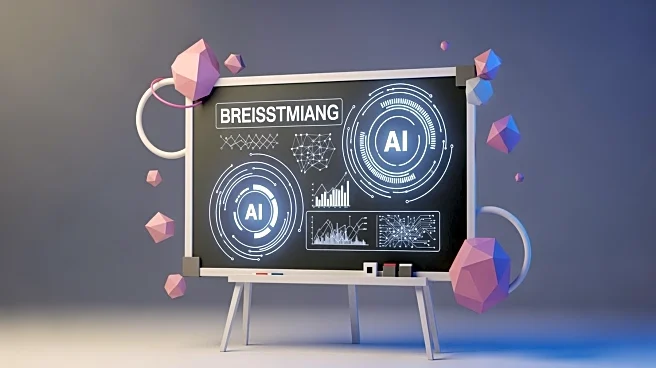What's Happening?
Mural, a popular online whiteboarding tool, has introduced new AI features aimed at enhancing the brainstorming process for users. The free version of Mural allows users to create up to three murals, which
can be shared with unlimited viewers. For those seeking more extensive capabilities, a paid subscription is required, starting at $12 per month per user. The paid version offers unlimited mural creation and editing rights for visitors. Mural's AI features include generating murals based on prompts, clustering sticky notes by topic, and creating content summaries. These features are designed to facilitate deeper exploration of ideas and improve collaboration among team members.
Why It's Important?
The introduction of AI features in Mural represents a significant advancement in the realm of digital collaboration tools. By automating aspects of the brainstorming process, Mural aims to increase efficiency and creativity among users. This development is particularly relevant for businesses and teams that rely on remote collaboration, as it provides new ways to organize and develop ideas. The ability to generate content summaries and cluster topics can streamline workflows and enhance productivity, making Mural a valuable tool for companies looking to innovate and adapt in a rapidly changing business environment.
What's Next?
As Mural continues to develop its AI capabilities, users can expect further enhancements that will make the platform even more integral to collaborative efforts. The company may introduce additional features that leverage AI to provide insights and recommendations based on user input. Businesses and teams using Mural will likely explore new ways to integrate these tools into their existing processes, potentially leading to more dynamic and effective brainstorming sessions. The ongoing evolution of Mural's platform could also influence other digital collaboration tools to adopt similar AI-driven features.
Beyond the Headlines
The integration of AI into brainstorming tools like Mural raises questions about the future of creative processes in business settings. While AI can enhance efficiency, it also challenges traditional methods of idea generation, potentially shifting the balance between human intuition and machine-driven insights. This development may lead to discussions about the ethical implications of relying on AI for creative tasks and the importance of maintaining a human touch in innovation.











